Free Presbyterian Church of Scotland
Free Presbyterian Church of Scotland
Jump to navigation
Jump to search
| Free Presbyterian Church of Scotland | |
|---|---|
 Free Presbyterian Church of Scotland, Glendale | |
| Classification | Protestant |
| Orientation | Calvinist |
| Polity | Presbyterian polity |
| Origin | 1893 |
| Separated from | Free Church of Scotland (1843-1900) |
| Separations | Associated Presbyterian Churches (separated 1989) |
| Congregations | 45 world wide (29 in Scotland) |
| Members | 1200 in Scotland(Based on latest census figures) |
| Official website | http://www.fpchurch.org.uk/ |
The Free Presbyterian Church of Scotland (Scottish Gaelic: An Eaglais Shaor Chlèireach) was formed in 1893 and claims to be the spiritual descendant of the Scottish Reformation: its web-site states that it is 'the constitutional heir of the historic Church of Scotland'.[1] It is occasionally referred to by the pejorative term the Wee Wee Frees (as distinct from the pejorative "Wee Frees", the post-1900 Free Church of Scotland).[2][3] Although small the church has congregations on five continents.
The Free Presbyterian Church of Scotland is Reformed in doctrine, worship and practice, and says that all its actions are based on the Word of God: the Bible. The subordinate standard of the church is the Westminster Confession of Faith.
Contents
1 History
1.1 Split in 1989
1.2 Disunity in the Scottish Reformed church scene
2 Recent developments
3 Presbyteries
3.1 Asia Pacific Presbytery
3.2 Northern Presbytery
3.3 Outer Isles Presbytery
3.4 Southern Presbytery
3.5 Western and Skye Presbytery
3.6 Zimbabwe Presbytery
4 List of congregations in the UK
5 References
6 External links
History[edit]
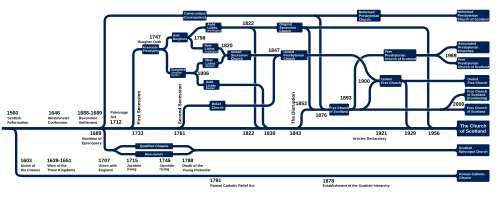
Timeline showing the evolution of the churches of Scotland from 1560
In 1892 the Free Church of Scotland, following the example of the United Presbyterian Church of Scotland and the Church of Scotland (1889), passed a Declaratory Act relaxing the stringency of subscription to the Westminster Confession of Faith, which was widely perceived as paving the way for unification with the United Presbyterian Church. This was met by a protest from Rev Donald MacFarlane (1834-1926) of Kilmallie (later of Raasay)[4], who was later joined by one other minister, the Rev Donald MacDonald (1825-1901) of Shieldaig. The result was that a large number of elders and some congregations, mostly in the Highlands, severed their connection with the Free Church of Scotland and formed the Free Presbyterian Church of Scotland, along lines they considered to be more orthodox. By 1907 this body had twenty congregations and twelve ministers.
A few years after the Free Presbyterian Church of Scotland (FPC Church) was formed (in 1900), the Free Church of Scotland united with the United Presbyterian Church of Scotland to form the United Free Church of Scotland, with a somewhat larger minority remaining outside the union and retaining the name Free Church of Scotland. Initially, some wondered if the two churches would merge, but this did not happen, partly because the grounds on which the later separation was based had been the Establishment Principle,[5] rather than the Declaratory Act, which had only been rescinded post separation by the Free Church of Scotland (post 1900).The two denominations took a different view of the 1892 Declaratory Act: the Free Church of Scotland did not regard it as having been a binding measure while the Free Presbyterians did.
In 1905 the Free Presbyterian Synod debated proposals for union with the post-1900 Free Church minority. The Synod declared that it would consider union with a church which held ‘the infallibility and inerrancy of the Scriptures of the Old and New Testaments, and the whole doctrine of the Confession of Faith, both in her profession and practice’. The Synod’s assessment of the post-1900 Free Church was that ‘although she made ample profession in words’ nevertheless she ‘came far behind in her practice’. One major issue was the Free Church's employment of Dr WM Alexander, who had written a book which the FPs and some post-1900 Free Church conservatives believed to be ambiguous about the status of the Bible, as a lecturer in its college. A 1917 Free Church Reply to a FPC Statement of Differences stated underlined the fact that Dr Alexander had in 1905 withdrawn the book from circulation, expressed regret 'for any reflections which the book was fitted to cast on the infallibility of the Word of God' and in 1906 publicly reaffirmed his belief in the inerrancy of Scripture in these words: 'I cherish as more precious than life itself the absolute infallibility of the Word of God'. However a motion was carried at the 1918 FPC Synod which characterized the Reply as containing 'evasive statements and suggestions of compromise'.[6]
Some of the Free Presbyterian ministers preferred union with the post-1900 Free Church minority to maintaining a separate Free Presbyterian witness. In 1905 Revs John Macleod (Kames), Alexander Stewart (Edinburgh) and George Mackay (Stornoway) were accepted by the Free Church. In 1918, Revs John R Mackay (Inverness), Alexander Macrae (Portree) and Andrew Sutherland followed suit.[7]

A communion token from the Free Presbyterian Church.
The two denominations are often confused, though not as often as in the past: they were initially of a predominantly Highland background, continue to share support for the Westminster Confession of Faith, and express a socially conservative outlook. However, the Free Presbyterian Church considers it a sin to use public transport to go to church on the Sabbath,[8] while the Free Church does not. The Free Church permits the use of modern Bible translations, while the Free Presbyterian Church prescribes the exclusive use of the Authorized Version in public worship (by resolution of the Synod in 1961[9]), and as the only version recommended for use in family and private devotions..
Split in 1989[edit]
In 1989, a splinter group formed the Associated Presbyterian Churches "following the perceived failure of the Free Presbyterian Church of Scotland to put into practice chapters 20 and 26 of the Westminster Confession of Faith",[10] following the suspension of Lord Advocate Lord Mackay of Clashfern as an elder for attending the Roman Catholic funeral masses of fellow judges. The Moderator of Synod at the time was a minister from Zimbabwe, the late Aaron Ndebele, an Ndebele.
The FPC continues to oppose many aspects of the Roman Catholic church including the mass. It also protests from time to time against figures in positions of authority and the Royal Family attending mass. It wrote to Prince Charles to complain of his presence at a requiem mass for a cousin in 2013.[11]
Disunity in the Scottish Reformed church scene[edit]
The Free Presbyterians believe that the denominations in Scotland adhering to the Westminster Confession of Faith should unite with it after repentance over historical retreat from the Confession. The FPC Catechism (the 2013 edition is an updated version of the original 1942-1943 edition) says: 'All Presbyterian Churches in Scotland claiming to represent the Reformed Church and who have caused or who maintain schisms contrary to the avowed Westminster Standards are bound to repent and to return to purity in doctrine, worship, government and discipline. The Free Presbyterian Church of Scotland is not guilty of schism and claims to be the true heir of the Reformed Church of Scotland in doctrine, worship, government and discipline. While she certainly does not claim perfection, she maintains that all churches in Scotland should unite around her constitution and testimony'.[12]
Recent developments[edit]
Church extension work tends to be low-key and results to be measured in the long-term in the Free Presbyterian Church. It stresses the need for the Holy Spirit to work in the soul before any spiritual life will be present, the need for the church to provide Bible-based and Christ-focused preaching, emphasizes the need for a holy life by those who claim conversion, and encourages example as well as precept in evangelism. It has not emulated other evangelical churches in their approach to reaching the secular UK. Its Catechism explains: 'Many modern churches have drama, dancing, and music bands in their worship and use sport and social entertainment to attract and retain young people; but these things are of the world and should not be countenanced by the Church of Christ for promoting the interests of the kingdom'.[13]
Public pronouncements about the current state of the nation tend to combine concern about Free Presbyterian spiritual decline with fears of increased secularization of other Reformed churches. A recent report to the FP Religion and Morals Committee quoted from a FP Outer Isles presbytery report, but said the issues were relevant for many other parts of the country. 'We must acknowledge the low state of religion among ourselves' it said, adding of other denominations: '...we find that many professing Christians in the Churches are actively encouraged to continue their former worldly interest in professional and amateur sport, worldly music, entertainments such as the cinema, dances, use of public houses, concerts and ceilidhs, and that many speak and dress like the world with little distinction to be found between them and their former companions'.[14]
Presbyteries[edit]
The individual churches[15] of the Free Presbyterian Church of Scotland are each part of[16] one of six[17]Presbyteries. Presbyteries meet regularly, and all Presbyteries meet at the yearly Synod in May.
Asia Pacific Presbytery[edit]
The Asia Pacific Presbytery covers Australia, New Zealand and Singapore. The congregations in Australia[18] are found on the East Coast: one in Grafton (received 1911),[19] and one in Sydney.[20]
The congregations in New Zealand are all on the North Island: Auckland,[21]Gisborne (founded 1954), Tauranga, and Carterton.
There is one congregation in Singapore (received 2000).
Northern Presbytery[edit]
The Northern Presbytery[22] comprises the congregations Inverness, Dingwall, and Aberdeen among others.
Outer Isles Presbytery[edit]
The Outer Isles Presbytery consists of the congregations on the Outer Hebrides.
Southern Presbytery[edit]
The Southern Presbytery[23] consists of the Scottish congregations South of the Scottish Highlands, and the congregations in England and North America. There is one congregation in London (founded 1898). There is one congregation in Canada, in Chesley, Ontario (founded 1902).[24] In the United State of America there is one congregation, in Santa Fe, Texas (received 2000).[25]
Western and Skye Presbytery[edit]
The Western and Skye Presbytery[26] consists of the Western parts of Scotland including Skye, but also the congregation in Odessa,[27] in the Ukraine (received 2002).
Zimbabwe Presbytery[edit]
in Zimbabwe services are held in forty locations[28] with their centres in Bulawayo, Ingwenya, Mbuma, New Canaan and Zenka. The Zimbabwe mission began in 1904.
List of congregations in the UK[edit]
| Congregation | Location(s) | Image | Founded |
|---|---|---|---|
| Aberdeen Congregation | Aberdeen, Aberdeen | 1963 | |
| Applecross and Shieldaig Congregation | Applecross and Shieldaig, Highland |  | |
| Barnoldswick Congregation | Barnoldswick, Lancashire and Sandbach, Cheshire Cheadle and Gatley, Greater Manchester | ||
| Bonar and Dornoch Congregation | Bonar Bridge and Dornoch, Highland | 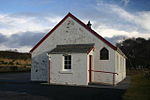
| |
| Broadstairs Congregation | Broadstairs, Kent | ||
| Bracadale Strath (Struan) Congregation | Struan, Highland |  | |
| Dingwall and Beauly Congregation | Dingwall and Beauly, Highland | ||
| Duirinish (Vatten/Glendale) Congregation | Vatten, Waternish and Glendale, Highland | 
| |
| Edinburgh Congregation | Edinburgh, Edinburgh | 1893 | |
| Farr and Daviot Congregation | Farr, Tomatin and Stratherrick, Highland | ||
| Fort William Congregation | Fort William, Highland | ||
| Gairloch Congregation | Gairloch, Highland | ||
St Jude's Church, Glasgow | Glasgow, Glasgow |  | 1893 |
| Greenock Congregation | Greenock, Inverclyde | ||
| Halkirk Congregation | Halkirk, Thurso and Strathy, Highland |  | |
| Inverness Congregation | Inverness, Highland | 1893 | |
| Kinlochbervie and Scourie Congregation | Kinlochbervie and Scourie, Highland |  | |
| Laide Congregation | Laide, Highland |  | |
| Larne Congregation | Larne, Antrim | 1988 | |
| Lochcarron and Kyle of Lochalsh Congregation | Lochcarron, Kishorn and Kyle of Lochalsh, Highland | ||
| London Congregation | Whitechapel, London | 1898 | |
| Ness Congregation | Ness, Na h-Eileanan Siar | ||
| North Harris (Tarbert) Congregation | Tarbert and Stocinis, Na h-Eileanan Siar | 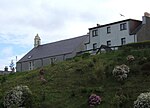 | |
| North Tolsta Congregation | North Tolsta, Na h-Eileanan Siar |  | |
| North Uist Congregation | Bayhead and Sollas, Na h-Eileanan Siar | 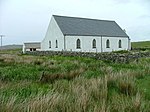 | 1893 |
| Perth Congregation | Perth, Perth and Kinross | ||
| Portree Congregation | Portree, Highland | ||
| Raasay Congregation | Raasay, Highland | 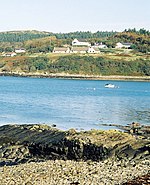 | |
| South Harris (Leverburgh) Congregation | Leverburgh and Sheilebost, Na h-Eileanan Siar |  | |
| Staffin Congregation | Staffin, Highland | ||
Stornoway Congregation | Stornoway and Achmore, Na h-Eileanan Siar |  | c. 1893 |
| Uig Congregation | Uig, Na h-Eileanan Siar | ||
| Ullapool and Lochinver Congregation | Ullapool, Highland | 1893 |
References[edit]
^ "Who We Are". Free Presbyterian Church of Scotland. Retrieved 26 February 2015..mw-parser-output cite.citationfont-style:inherit.mw-parser-output .citation qquotes:"""""""'""'".mw-parser-output .citation .cs1-lock-free abackground:url("//upload.wikimedia.org/wikipedia/commons/thumb/6/65/Lock-green.svg/9px-Lock-green.svg.png")no-repeat;background-position:right .1em center.mw-parser-output .citation .cs1-lock-limited a,.mw-parser-output .citation .cs1-lock-registration abackground:url("//upload.wikimedia.org/wikipedia/commons/thumb/d/d6/Lock-gray-alt-2.svg/9px-Lock-gray-alt-2.svg.png")no-repeat;background-position:right .1em center.mw-parser-output .citation .cs1-lock-subscription abackground:url("//upload.wikimedia.org/wikipedia/commons/thumb/a/aa/Lock-red-alt-2.svg/9px-Lock-red-alt-2.svg.png")no-repeat;background-position:right .1em center.mw-parser-output .cs1-subscription,.mw-parser-output .cs1-registrationcolor:#555.mw-parser-output .cs1-subscription span,.mw-parser-output .cs1-registration spanborder-bottom:1px dotted;cursor:help.mw-parser-output .cs1-ws-icon abackground:url("//upload.wikimedia.org/wikipedia/commons/thumb/4/4c/Wikisource-logo.svg/12px-Wikisource-logo.svg.png")no-repeat;background-position:right .1em center.mw-parser-output code.cs1-codecolor:inherit;background:inherit;border:inherit;padding:inherit.mw-parser-output .cs1-hidden-errordisplay:none;font-size:100%.mw-parser-output .cs1-visible-errorfont-size:100%.mw-parser-output .cs1-maintdisplay:none;color:#33aa33;margin-left:0.3em.mw-parser-output .cs1-subscription,.mw-parser-output .cs1-registration,.mw-parser-output .cs1-formatfont-size:95%.mw-parser-output .cs1-kern-left,.mw-parser-output .cs1-kern-wl-leftpadding-left:0.2em.mw-parser-output .cs1-kern-right,.mw-parser-output .cs1-kern-wl-rightpadding-right:0.2em
^ Peterkin, Tom (16 December 2002). "Spinster's £1m to Wee Wee Frees". The Daily Telegraph. Retrieved 28 April 2012.
^ Cramb, Auslan (13 April 2006). "The 'sinners' set sail for the Hebrides". The Daily Telegraph. Retrieved 28 April 2012.
^ Ewings Annals of the Fee Church
^ http://www.fpchurch.org.uk/magazines/fpm/2001/April/article3.php
^ MacPherson, MacPherson (1970). History of the Free Presbyterian Church of Scotland 1893-1970. Publications Committee, Free Presbyterian Church of Scotland. pp. 125–127.
^ MacPherson, MacPherson (1970). History of the Free Presbyterian Church of Scotland 1893-1970. Publications Committee, Free Presbyterian Church of Scotland. pp. 108, 130.
^ Murray, Iain (1984). The Life of John Murray. Banner of Truth Trust. p. 35.
^ Synod Resolution on Versions of the Bible
^ "About the APC « AP Church". Retrieved 26 February 2015.
^ FPC (2014). Proceedings of Synod Together with Reports and Accounts, May 2014. Free Presbyterian Church of Scotland. pp. 9, 10.
^ FPC (2013). A Catechism of the History and Principles of the Free Presbyterian Church of Scotland. Free Presbyterian Church of Scotland. p. 40.
^ A Catechism of the History and Principles of the Free Presbyterian Church of Scotland. FPC. 2013. p. 45.
^ Proceedings of Synod Together With Reports and Accounts May 2014. FPC. 2014. pp. 14, 15.
^ "Places of Worship". Retrieved 23 November 2015.
^ "How We Are Organised". Retrieved 23 November 2015.
^ "Galleries of FP Churches". Retrieved 23 November 2015.
^ Ward, Rowland; Humphreys, Robert (1995). Religious Bodies in Australia: A comprehensive Guide (3rd ed.). New Melbourne Press. p. 86. ISBN 978-0-646-24552-2.
^ "Grafton Free Presbyterian Church". Retrieved 18 August 2017.
^ "Sydney Free Presbyterian Church of Scotland". Retrieved 23 November 2015.
^ "Free Presbyterian Church Auckland Congregation". Retrieved 23 November 2015.
^ "Gallery of FP Churches – Northern Presbytery". Retrieved 23 November 2015.
^ "Gallery of FP Churches – Southern Presbytery". Retrieved 23 November 2015.
^ "Chesley Congregation". Retrieved 23 November 2015.
^ "FP Church Santa Fe". Retrieved 23 November 2015.
^ "Gallery of FP Churches – Western and Skye Presbytery". Retrieved 23 November 2015.
^ "Главная - Свободная Пресвитерианская Церковь Украины". Retrieved 26 February 2015.
^ "Gallery of FP Churches – Zimbabwe Presbytery". Retrieved 23 November 2015.
External links[edit]
- Official website
- Free Presbyterian Church of Scotland in Australia
- Free Presbyterian Church of Scotland in New Zealand
- Texas Free Presbyterian Church of Scotland
Categories:
- Presbyterianism in Scotland
- Religious organisations based in Scotland
- Religious organizations established in 1893
- Presbyterian denominations in Scotland
- Protestant denominations established in the 19th century
- 1893 establishments in Scotland
- Reformed denominations in Europe
- Protestantism in the United Kingdom
- Presbyterian denominations in Europe
- Reformed denominations in the United Kingdom
(window.RLQ=window.RLQ||).push(function()mw.config.set("wgPageParseReport":"limitreport":"cputime":"0.440","walltime":"0.533","ppvisitednodes":"value":1608,"limit":1000000,"ppgeneratednodes":"value":0,"limit":1500000,"postexpandincludesize":"value":58437,"limit":2097152,"templateargumentsize":"value":650,"limit":2097152,"expansiondepth":"value":7,"limit":40,"expensivefunctioncount":"value":3,"limit":500,"unstrip-depth":"value":1,"limit":20,"unstrip-size":"value":70716,"limit":5000000,"entityaccesscount":"value":1,"limit":400,"timingprofile":["100.00% 388.051 1 -total"," 38.22% 148.314 15 Template:Cite_web"," 16.59% 64.384 1 Template:Infobox_Christian_denomination"," 12.47% 48.400 1 Template:Infobox"," 9.14% 35.473 8 Template:Cite_book"," 8.85% 34.360 1 Template:Official_website"," 8.06% 31.262 1 Template:Authority_control"," 3.61% 13.992 1 Template:Scottish_religion"," 3.09% 11.994 2 Template:Cite_news"," 2.70% 10.477 1 Template:Navbox"],"scribunto":"limitreport-timeusage":"value":"0.219","limit":"10.000","limitreport-memusage":"value":4054547,"limit":52428800,"cachereport":"origin":"mw1328","timestamp":"20190225070039","ttl":2073600,"transientcontent":false);mw.config.set("wgBackendResponseTime":107,"wgHostname":"mw1243"););



